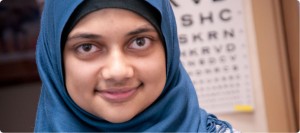M&M: As an accomplished, modern American woman, why do you choose to wear a headscarf, or hijab?
Amin: All my life, but especially when I was a child, I never felt that I was much different from my peers. Perhaps it is because from my viewpoint I was unable to see my own brown skin. All my friends were white and Christian, but we all had the same interests and pastimes and were influenced by the same American culture. In many ways, I could relate to my friends more than I could ever hope to relate to my parents, who grew up in a completely different culture and environment. However, when my parents started teaching me about Islam, I began to realize that this would be something that would distinctly set me apart from all my Christian friends. Although both religions share much in common and emphasize the same basic values and principles, there are fundamental differences in practice that I could not ignore. As I grew older, tenets like the five daily prayers and wearing hijab began to play a larger and larger role in my life, and I began to realize that I would never blend into Montanan society, nor did I want to.
It is true that ever since I began wearing a hijab, I have felt as though I attract even more attention than before, simply because it is such a rare sight in Montana. In a way, I’ve felt a responsibility to represent Islam, as it is the reason behind my dress. In a time when Islam is so misunderstood, I hope that I can play a role in correcting misconceptions simply by answering the sundry of questions that are elicited by my hijab. I certainly don’t claim to be the “ideal Muslim,” but there are many occasions when I check my actions by asking myself, “Would I want to be known for this while dressed as a Muslim?”
I know that for many people in Montana, I may be the only Muslim they will ever meet, and I’d like to leave a good impression in that image. While there is an overwhelming media portrayal of terrorist “Muslims,” I hope that I can leave an impression on people so that they’ll say: “I met a Muslim girl in Montana once. She was nothing like that!”
I recently read a study that found that most people in the U.S. who harbor prejudices towards Islam or Muslims have never met a Muslim themselves, and I think that makes all the difference. In reality, we are not all terrorists, criminals or mentally disturbed. We are just like the majority of all Americans, sharing the same day-to-day concerns and aspirations for the future.
Is your drive for excellence rooted in looking different from your peers?
I don’t think I chose to be ambitious or hardworking because I looked different. I believe these qualities were somewhat innate in me, but also strongly influenced by my parents. My parents have shared their personal struggles with me for as long as I can remember, about the challenges they overcame in order to pursue a higher education, immigrate to the U.S., and raise a practicing Muslim family in a remote place like Montana. I will forever admire their courage and foresight to achieve such lofty goals.
It is hard for me to pinpoint the exact cause of my drive, but I’m sure it had a lot to do with my parents’ encouragement and my desire to meet their expectations. However, I remember having a strong inclination to “learn” from a very young age. At the end of preschool, one of our year-end projects was to set a goal to learn a new skill, which we would present to our class at an end-of-the-year party. My classmates chose things like learning how to zip a jacket or tie their own shoelaces. I decided to learn how to read an entire book by myself. I still remember this so clearly, because it was one of the most exciting times of my life. I checked out a small, hard cover picture book from the public library about a dad and a baby, and practiced for hours and hours with my mom until I could read the entire book fluently, without any stumbles. I was only 4, but I still remember it as one of the proudest days of my life when I read that book aloud to my classmates and all the parents who had come to watch. I think these memories are telling of who I am.
You were raised in dual cultures–American and Bengali. Why does Bozeman feel like home?
I could have been born with the same drive and talents in a different country, perhaps to a family struggling with poverty, and I never would have had the opportunities to succeed that I have had growing up in Bozeman. I can only feel blessed for being where I am today and for being given the opportunities to use my strengths in a meaningful way.
In my travels around the world, particularly in Bangladesh, I have met some of the most incredible, bright children, who happened to be born to a destitute mother and a father who never cared to be one. Through no fault of their own, these children end up on the streets, raised by others with similar backgrounds. It doesn’t matter how smart or talented they are. Most of these children can never hope to enjoy even the simplest of pleasures, like a warm meal or a bed to sleep in at night.
Attending medical school at one of the top institutions in the world is a dream beyond even their wildest imaginations. Even though I’m far removed from their experiences, it doesn’t feel all that distant. My blood is just as Bengali as theirs, and it is only by a small stroke of fate that I ended up here and not there.


















